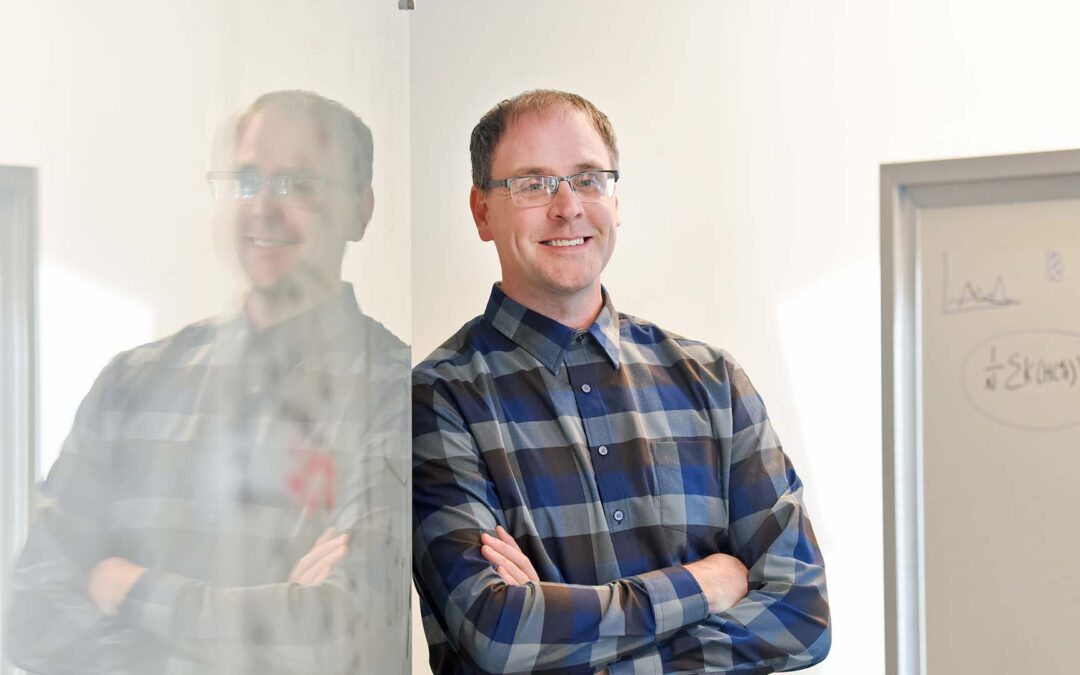A driving force behind Ross Maciejewski’s research is being able to use visualization to address real-world problems.
While earning his doctoral degree at Purdue University, Maciejewski worked in the Visual Analytics for Command, Control, and Interoperability Environments, or VACCINE, a Department of Homeland Security Center of Excellence, which influenced the course of his career.
“I worked in that center for a number of years and it really shifted my focus to real-world problems, like law enforcement, health care and anomaly detection,” he says. “That experience led to me getting fellowship funding from the Department of Homeland Security.”
In 2011, Maciejewski joined the Ira A. Fulton Schools of Engineering, where Arizona State University’s vision for the New American University helped him further develop his research objectives in visual analytics to address solutions for law enforcement, health care and anomaly detection.
“I saw that the problems I’m interested in paralleled this model at ASU, investigating use-inspired research and vetting solutions that can help the community,” Maciejewski says. “It can be really fulfilling to see how this research can be deployed in the field, especially when the problems we’re researching can have a tangible impact.”
In the School of Computing and Augmented Intelligence, part of the Fulton Schools at ASU, Maciejewski has spent the last six years as director of the Center for Accelerating Operational Efficiency, or CAOE, a Department of Homeland Security Center of Excellence.
Envisioned as a joint center at the intersection of industrial engineering and computer science, CAOE develops and applies advanced analytical tools and technologies to enhance planning, information sharing and real-time decision making in homeland security operations.
“The nice thing about visualization is that there are always people who need help analyzing their data,” Maciejewski says. “There are always new and interesting domain problems and sciences to work on, so we are able to gain knowledge about a variety of different fields.”
Maciejewski has received several notable awards for his research, including the ACM CHI Honorable Mention Award in 2022 for his research titled, “Annotating Line Charts in the Wild,” the IEEE Transactions on Visualization and Computer Graphics Best Associate Editor Award in 2021, and the ACM CHI Honorable Mention Award in 2018 for research titled, “TopoText: Context-Preserving Text Data Exploration Across Multiple Spatial Scales.”
Earlier, he won the 2017 EuroVis Best Paper Award for research titled, “Nested Tracking Graphs,” the VAST Grand Challenge Award: Outstanding Comprehensive Submission awarded at the IEEE Conference on Visual Analytics Science and Technology in 2015 for the “VADER/VIS-Grand Challenge,” and the Meritorious Team Commendation from the U.S. Coast Guard in 2013 for his work at Purdue’s VACCINE Center as part of the Port Resilience for Operational Tactical Enforcement to Combat Terrorism, or PROTECT, team.
Most notably, he received the prestigious National Science Foundation Faculty Career Development, or CAREER, Award in 2014 for his research in visual analytics, which awarded $450,000 for his research and outreach efforts.
In the Fulton Schools, Maciejewski has been honored by Dean Kyle Squires with the title of Ira A. Fulton Professor of Computer Science and was named an ASU Fulton Faculty Exemplar and Global Security Fellow.
Now, Maciejewski is taking on a new role as director of the School of Computing and Augmented Intelligence. In CAOE, he will continue as co-director alongside industrial engineering Assistant Professor Adolfo Escobedo, who Maciejewski says will bring a fresh perspective and elevate the center’s mission with his strong background in mathematics.
“I’m excited for the opportunity to be able to drive an agenda at the intersection of all the different degree programs we have within SCAI, and be able to leverage those within Phoenix and Arizona,” he says. “SCAI is a wonderful school with incredible potential, and my goal is to continue growing these programs and offering students high quality education while serving the New American University mission for access and inclusivity.”
His vision for the future of the School of Computing and Augmented Intelligence also includes goals to establish the school as a premier research institution, continue to raise the school’s national rankings, attract research funding, elevate degree programs and collaborate with staff and faculty to achieve common goals.
“SCAI offers an interesting intersection between computer science and industrial engineering, which are programs that have a lot of synergy and that I see having a potential for growth that would allow really exciting opportunities,” Maciejewski says. “As director, I’m looking forward to leveraging this potential and exploring how we can incorporate computational technology advances into our degree offerings.”
Outside of his work at ASU, Maciejewski’s world is centered around family. Much of his free time is spent exploring attractions in Phoenix with his wife and two-year-old son.
